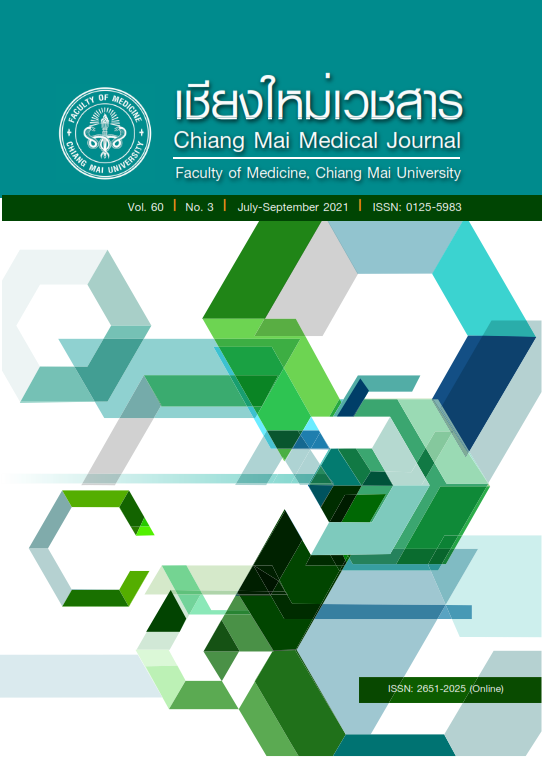Prevalence and factors associated with caregiver burden in caregivers of elderly dependents in San Pa Tong District, Chiang Mai
Keywords:
caregiver, burden, sleep quality, elderly, dependent, neurological diseaseAbstract
Objectives To study the prevalence of and factors associated with caregiver burden in caregivers of elderly dependents.
Methods A cross-sectional study was conducted using questionnaires to collect data from caregivers of elderly dependents [age ≥ 60] in San Pa Tong District, Chiang Mai, Thailand between February-July 2020. The questionnaires included general demographic data of the caregivers and their elderly dependents plus the Zarit Burden Inventory (ZBI), the Pittsburg Sleep Quality Index (PSQI) and the Patient Health Questionnaire-9 (PHQ-9). Multivariable logistic regression analysis was used to examine the association between factors and caregiver burden.
Results A total of 136 pairs of caregivers and their dependent elderly patients were included in the study. The prevalence of caregiver burden was 80.15%, divided into low to moderate (38.24%), moderate to severe (38.97%) and severe (2.94%). The Mean ZBI score was 34.65 ± 15.51. There was a statistically significant association between poor sleep quality of the caregivers and caregiver burden. Caregivers with poor sleep quality were 8.87 times more likely to have caregiver burden than caregivers with good sleep quality (95%CI = 1.32 - 59.52, p = 0.02). In addition, caretakers of patients whose dependence was due to neurological disease were 5.21 times more likely to have caregiver burden than those of patients without neurological disease. The difference approached statistical significance (95%CI = 0.94 - 28.78, p = 0.05).
Conclusions Caregiver burden in caregivers of dependent elderly patients is common and is significantly associated with poor sleep quality in caregivers, particularly where the cause of dependence is neurological. Screening for caregiver burden and sleep quality should be performed for caregivers of elderly dependents.
References
Department of older person of Thailand. Document personnel Thai 2015. [cited 2021 Jan 5]. Available from: http://www.dop.go.th/download/knowledge/knowledge_th_20160106135752_1.pdf
Department of older person of Thailand. Older statistics. 2020. [cited 2021 Jan 5]. Available from: http://www.dop.go.th/en/know/2/67.
Chiang Mai Provincial Public Health Office. Provincial government report form. 2016. [cited 2021 Jan 5]. Available from: https://www.chiangmaihealth.go.th/cmpho_web/document/160801147005483435.doc
Yoshida D, Ninomiya T, Doi Y, Hata J, Fukuhara M, Ikeda F, et al. Prevalence and causes of functional disability in an elderly general population of Japanese: the Hisayama study. J Epidemiol. 2012;22:222-9.
Agüero-Torres H, Fratiglioni L, Guo Z, Viitanen M, von Strauss E, Winblad B. Dementia is the major cause of functional dependence in the elderly: 3-year follow-up data from a population-based study. Am J Public Health. 1998;88:1452-6.
Lui SK, Nguyen MH. Elderly stroke rehabilitation: overcoming the complications and its associated challenges. Curr Gerontol Geriatr Res. 2018;2018:9853837.
Martins AS, Rezende NA, Torres HO. Occurrence of complications and survival rates in elderly with neurological disorders undergoing enteral nutrition therapy. Rev Assoc Med Bras. 2012;58:691-7.
Reinhard SC, Given B, Petlick NH, Bemis A. Supporting family caregivers in providing care. In: Hughes RG, editor. Patient safety and quality: an evidence-based handbook for nurses. Rockville: Agency for Healthcare Research and Quality (US); 2008. p. 341-404.
Schulz R, Tompkin CA. Informal caregivers in the United States: prevalence, caregiver characteristics, and ability to provide care. The role of human factors in home health care: National Academies Press (US); 2010.
Schulz R, Eden J, National Academies of Sciences E, Medicine. Family caregiving roles and impacts. Families caring for an aging America: National Academies Press (US); 2016.
Rittiar K. Concept of family caregiving (Part I) [cited 2021 Jan 22]. Available from: https://www.gotoknow.org/posts/121180.
Limpawattana P, Theeranut A, Chindaprasirt J, Sawanyawisuth K, Pimporm J. Caregivers burden of older adults with chronic illnesses in the community: a cross-sectional study. J Community Health. 2013;38:40-5.
Simón MA, Bueno AM, Otero P, Blanco V, Vázquez FL. Caregiver burden and sleep quality in dependent people’s family caregivers. J Clin Med. 2019;8(7):1072.
Joling KJ, van Marwijk HW, Veldhuijzen AE, van der Horst HE, Scheltens P, Smit F, et al. The two-year incidence of depression and anxiety disorders in spousal caregivers of persons with dementia: who is at the greatest risk?. Am J Geriatr Psychiatry. 2015;23:293-303.
Ogunlana MO, Dada OO, Oyewo OS, Odole AC, Ogunsan MO. Quality of life and burden of informal caregivers of stroke survivors. Hong Kong Physiotherapy Journal. 2014;32:6-12.
Roth DL, Perkins M, Wadley VG, Temple EM, Haley WE. Family caregiving and emotional strain: associations with quality of life in a large national sample of middle-aged and older adults. Qual Life Res. 2009;18:679-88.
Loureiro LdSN, Fernandes MdGM, Marques S, Nobrega MMLd, Rodrigues RAP. Burden in family caregivers of the elderly: prevalence and association with characteristics of the elderly and the caregivers. Rev Esc Enferm USP. 2013;47:1129-36.
Peng HL, Chang YP. Sleep disturbance in family caregivers of individuals with dementia: a review of the literature. Perspect Psychiatr Care. 2013;49:135-46.
Liu S, Li C, Shi Z, Wang X, Zhou Y, Liu S, et al. Caregiver burden and prevalence of depression, anxiety and sleep disturbances in Alzheimer’s disease caregivers in China. J Clin Nurs. 2017;26:1291-300.
Peng HL, Lorenz RA, Chang YP. Factors associated with sleep in family caregivers of individuals with dementia. Perspect Psychiatr Care. 2018;55:95-102.
Rowe MA, McCrae CS, Campbell JM, Benito AP, Cheng J. Sleep pattern differences between older adult dementia caregivers and older adult noncaregivers using objective and subjective measures. J Clin Sleep Med. 2008;4:362-9.
Lee DR, Thomas AJ. Sleep in dementia and caregiving–assessment and treatment implications: a review. Int Psychogeriatr. 2011;23: 190-201.
Institute of Medicine Committee on Sleep M, Research. The National Academies Collection: Reports funded by National Institutes of Health. In: Colten HR, Altevogt BM, editors. Sleep disorders and sleep deprivation: an unmet public health problem. Washington (DC): National Academies Press; 2006. p. 151-4.
Happe S, Berger K, Investigators FS. The association between caregiver burden and sleep disturbances in partners of patients with Parkinson’s disease. Age Ageing. 2002;31:349-54.
Okuda S, Tetsuka J, Takahashi K, Toda Y, Kubo T, Tokita S. Association between sleep disturbance in Alzheimer’s disease patients and burden on and health status of their caregivers. J Neurol. 2019;266:1490-500.
McKibbin CL, Ancoli-Israel S, Dimsdale J, Archuleta C, von Kanel R, Mills P, et al. Sleep in spousal caregivers of people with Alzheimer’s disease. Sleep. 2005;28:1245-50.
Buysse DJ, Reynolds III CF, Monk TH, Berman SR, Kupfer DJ. The Pittsburgh Sleep Quality Index: a new instrument for psychiatric practice and research. Psychiatry Res. 1989;28:193-213.
Toonsiri C, Sunsern R, Lawang W. Development of the burden interview for caregivers of patients with chronic illness. J Nurs Educ. 2011;4:62-75.
Lotrakul M, Sumrithe S, Saipanish R. Reliability and validity of the Thai version of the PHQ-9. BMC Psychiatry. 2008;8:1-7.
Fernandes MdGM, Garcia TR. Tension attributes of the family caregiver of frail older adults. Rev Esc Enferm USP. 2009;43:818-24.
Kim SS, Oh KM, Richards K. Sleep disturbance, nocturnal agitation behaviors, and medical comorbidity in older adults with dementia: relationship to reported caregiver burden. Res Gerontol Nurs. 2014;7:206-14.
McCurry SM, Logsdon RG, Teri L, Vitiello MV. Sleep disturbances in caregivers of persons with dementia: contributing factors and treatment implications. Sleep Med Rev. 2007;11:143-53.
Bhattacharjee M, Vairale J, Gawali K, Dalal PM. Factors affecting burden on caregivers of stroke survivors: Population-based study in Mumbai (India). Ann Indian Acad Neurol. 2012;15:113-9.
Bekdemir A, Ilhan N. Predictors of caregiver burden in caregivers of bedridden patients. J Nurs Res. 2019;27:e24.
Li H, Zhang H, Huang H, Wang Y, Huang H. Caring burden and associated factors of care providers for senile dementia patients in an urban-rural fringe of Fuzhou City, China. Aging Clin Exp Res. 2012;24:707-13.
Karlikaya G, Yukse G, Varlibas F, Tireli H. Caregiver burden in dementia: A study in the Turkish population. The Internet Journal of Neurology. 2005;4:12-26.
Hanh PT, Jullamate P, Piphatvanitcha N. Factors related to caregiver burden among family caregivers of older adults with stroke in Hai duong, Vietnam. The Southern College Network Journal of Nursing and Public Health. 2017;4:45-62.
Sittironnarit G. Behavioral and psychological symptoms of dementia (BPSD): concept and treatment. J Psychiatr Assoc Thailand. 2011;56:499-62.
Razali R, Ahmad F, Rahman FN, Midin M, Sidi H. Burden of care among caregivers of patients with Parkinson disease: a cross-sectional study. Clin Neurol Neurosurg. 2011;113:639-43.
Downloads
Published
How to Cite
Issue
Section
License

This work is licensed under a Creative Commons Attribution-NonCommercial-NoDerivatives 4.0 International License.










